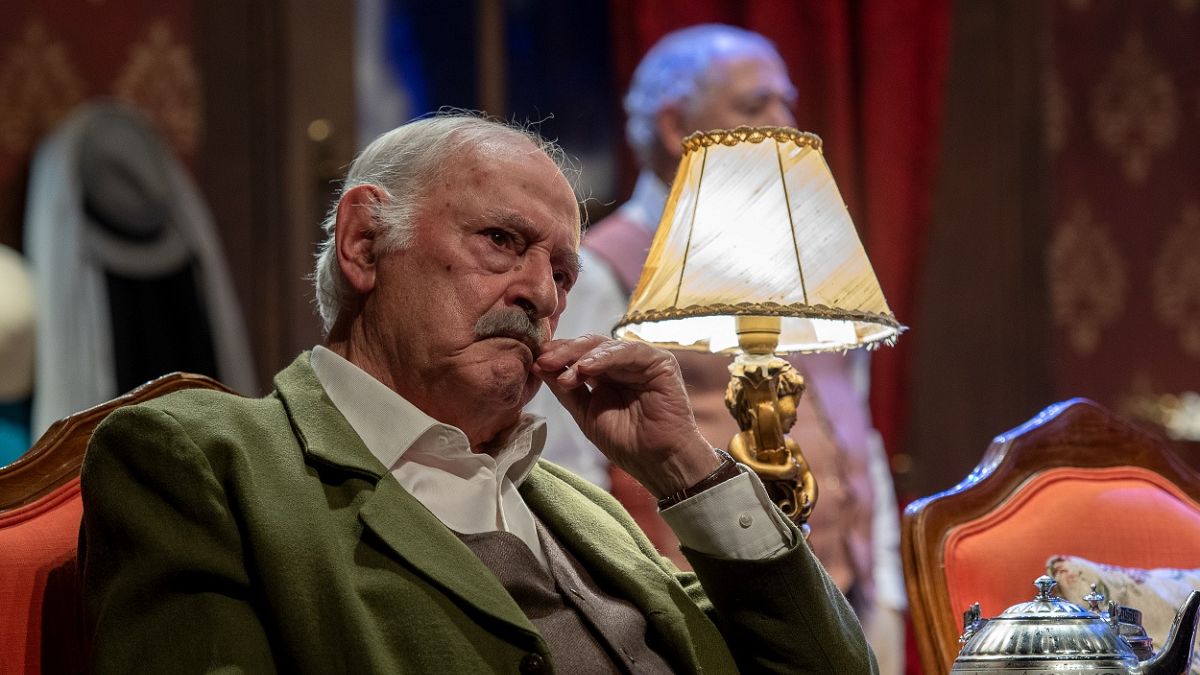At the age of 97 and a half, Ruy de Carvalho has earned the status of the world’s oldest actor still working in theatre. With no plans to leave the stage, he received Euronews Culture during the production of Agatha Christie’s “The Mousetrap”.
Teatro da Malaposta, in Odivelas, in the suburbs of Lisbon. Ruy de Carvalho welcomes us into his dressing room, two hours before he goes on stage once again as Major Metcalf in Agatha Christie’s play The Mousetrap.
Friendly but hurried, he doesn’t leave us room for more than three questions: he needs to concentrate and be alone for a while before going on stage. After all, even if he maintains the energy that allows him to go on stage practically every day, the years are already weighing on him: at 97 years and six months, he is the oldest theatre actor in the world still working.
To give you an idea, when this play premiered in London in 1952 – The Mousetrap is famous for having the world’s longest uninterrupted run, with an unbeatable record of 72 years – Ruy de Carvalho had already been an actor for 11 years and a professional for five.
The world’s a stage
He has played many roles in film and television, which have made him one of the best known faces to the Portuguese public, but his natural habitat, the one in which he has always moved like a fish in water, is the theatre.
In 1957, he was one of the first faces to appear on Portuguese television, which had just launched with the broadcast of Gil Vicente’s ‘Monólogo do Vaqueiro’ (The Cowboy’s Monologue ), the first tele-theatre presented in Portugal.
41 years later, in 1998, he experienced what was perhaps the most apotheotic moment of an entire career, when he was decorated by the then President of the Republic Jorge Sampaio, on the stage of the Dona Maria II National Theatre (whose resident cast he was a leading figure in), while performing William Shakespeare‘s King Lear. Throughout his career, he was honoured with the Grand Crosses of the Orders of Merit, Sant’iago de Espada and Infante D. Henrique.
But of all the dozens of plays he appeared in throughout his career, one particularly marked him out: In 1965, with the Teatro Moderno de Lisboa (the company he had founded four years earlier), he took José Cardoso Pires ‘O Render dos Heróis to the stage and played Cego, the character who represents the Portuguese people.
“I took great pleasure in representing the Portuguese people,” says Ruy de Carvalho. “He was a kind of scarecrow, with his back turned and, from time to time, he would turn to the audience and say what he thought about the world. And what I want for the world right now is for there to be lasting peace for everyone and for no-one to suffer,” he concludes.
Leaving the stage is not in Ruy de Carvalho’s plans: “I shouldn’t give up as long as I can work,” he told Euronews Culture: “I work because I feel I still have a memory and I can still memorise a text. I just ask that they aren’t very long texts, so I don’t have to spend too much time studying, because I study the papers at home. Improvisation takes a long time to work on,” he says.
For his colleagues on stage, working with him is a permanent lesson. Luís Pacheco stars with Ruy de Carvalho in The Mousetrap (where he plays the role of Giles Ralston) and also shares the stage with him in Ruy, a História Devida, the show that has already toured the country and where he shares with the audience the stories that have marked an eight-decade career on stage: “All of us actors want to be someone like him one day,” he says. “For us, he’s a constant learner. He’s always available, always attentive to everything, always learning despite his age. He continues to experience the stage as if for the first time.”
Elsa Galvão, who plays Mrs Boyle in The Mousetrap, also says that working alongside Ruy de Carvalho is an unforgettable experience: “Everyday we learn something. It’s marvellous to see him work with this energy and joy that he has on stage every day,” she says.
The Mousetrap is currently on stage at the Malaposta Theatre in Odivelas, with no end date yet, and should soon return for a nationwide tour. Perhaps the play won’t stay on stage for 72 years like it does in London, but Ruy de Carvalho seems ready to continue performing it for as long as it takes.
Journalist • Ricardo Figueira
Video editor • Bruno Filipe Figueiredo Da Silva

